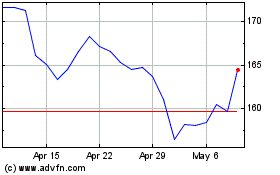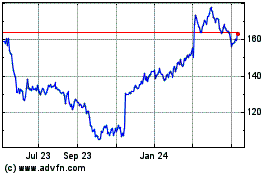By Sarah Nassauer in New York and Preetika Rana in New Delhi
Wal-Mart Stores Inc., Target Corp. and other big U.S. retailers
have become entangled in a controversy over whether one of India's
biggest textile companies has been supplying their stores with
phony "Egyptian cotton" sheets.
Egyptian cotton, which since colonial times has been prized for
its softness and durability, is often touted by stores that charge
a premium for bed sheets or bath towels made with the material. It
is found in everything, from Ritz-Carlton hotel sheets to Brooks
Brothers dress shirts.
Last Friday, Target said it was pulling thousands of items off
its shelves and cutting ties with Welspun India Ltd. after an
investigation determined Welspun had used non-Egyptian cotton for
about two years.
Wal-Mart, J.C. Penney Co. and Bed Bath & Beyond Inc., three
other big Welspun customers, said this week they were opening
investigations into whether the company supplied them with
authentic Egyptian-cotton products. "We will aggressively pursue
our investigation and take appropriate action, if needed," Bed Bath
& Beyond said on Wednesday.
Welspun says it has commissioned an accounting firm to review
its supply chain. "We are taking this situation very seriously...We
won't rest until this situation is resolved," the Indian company
said on Wednesday.
Welspun's share price has been sliced by half since the Target
allegations surfaced last Friday. Mumbai's stock exchange suspended
trading in its shares Wednesday, as the stock fell to its maximum
daily limit for a third-straight day.
Two-thirds of Welspun's $898 million in sales for the year ended
March 31 came from American retailers. The textile maker also
supplies towels for the Wimbledon tennis tournament and the Rugby
World Cup. Welspun declined to say how it sources its Egyptian
cotton, saying only that it would be covered as part of its
audit.
Egypt produced less than 1% of the global cotton supply last
year, according to the U.S. Department of Agriculture, and its
output has suffered amid political and economic upheaval in recent
years. Egypt's cotton production is estimated to be 320,000 bales
in 2016, or a third of what Egypt produced in 2006 (975,000 bales),
according to the USDA.
"There are a lot more Egyptian cotton goods than Egyptian
cotton," said Jordan Lea, co-owner of Eastern Trading Co., a
Greenville, S.C., cotton-trading firm. "It's impossible."
Like Cuban cigars or Champagne wines, the defining
characteristic of Egyptian cotton isn't necessarily its quality but
where it is grown. Any cotton harvested in Egypt -- there are
roughly 10 varieties grown -- can carry the label. Long-fiber
cotton sourced in Egypt is nearly indistinguishable from "long
staple" cotton grown in other parts of the world once it becomes
yarn or fabric, analysts say.
The Cotton Egypt Association, which licenses the trademark and
certifies suppliers, estimates that 90% of products labeled
"Egyptian cotton" are fakes but such public rebukes for mislabeling
are rare. In October, the government-supported group said it had
discovered the genomic fingerprint for Egyptian cotton and launched
a crackdown to combat knockoffs using DNA testing.
Welspun was one of Cotton Egypt's certified suppliers, having
received the "Egyptian Cotton Gold Seal" for its bed linens, bath
rugs and towels in April this year. The Egyptian association didn't
respond to a request for comment.
DNA testing, however, isn't widespread, said a spokesman for
Cotton Inc., which represents U.S. cotton producers and importers.
That has left manufactures and retailers mostly dependent on
following the raw material through a complex supply chain. Each
stage of a cotton product's production, from yarn making to fabric
cutting, often happens in a different country.
A search for "Egyptian cotton sheets" on Amazon.com turns up
more than 2 million results, while one on Walmart.com turns up more
than 24,000 results. Both figures include items sold by third
parties. Target.com now lists just six items.
A Target spokeswoman said about 750,000 sets of sheets in stores
between August 2014 and July 2016 under the Fieldcrest brand were
labeled as made with Egyptian cotton.
She declined to say what triggered the company's investigation
into Welspun. The company said Welspun's conduct "was a clear
violation" of its policies.
The discovery underscores the difficulties of policing a global
supply chain, where large retailers assemble a sprawling network of
suppliers in developing countries to produce their goods at cheaper
cost.
Global retailers often complain of poor quality and weak
compliance at factories in India and Bangladesh, but the tangled
networks make it tough to assess blame when things go wrong.
Welspun is regarded as an Indian manufacturing success story,
blossoming from a small yarn-spinning business in 1985 into one of
Asia's largest textile makers. Large U.S. retailers flocked to the
company as a relative safe haven from the production issues that
have troubled some local firms in developing countries.
--Khadeeja Safdar contributed to this article.
Write to Sarah Nassauer at sarah.nassauer@wsj.com and Preetika
Rana at preetika.rana@wsj.com
(END) Dow Jones Newswires
August 24, 2016 16:48 ET (20:48 GMT)
Copyright (c) 2016 Dow Jones & Company, Inc.
Target (NYSE:TGT)
Historical Stock Chart
From Mar 2024 to Apr 2024

Target (NYSE:TGT)
Historical Stock Chart
From Apr 2023 to Apr 2024
